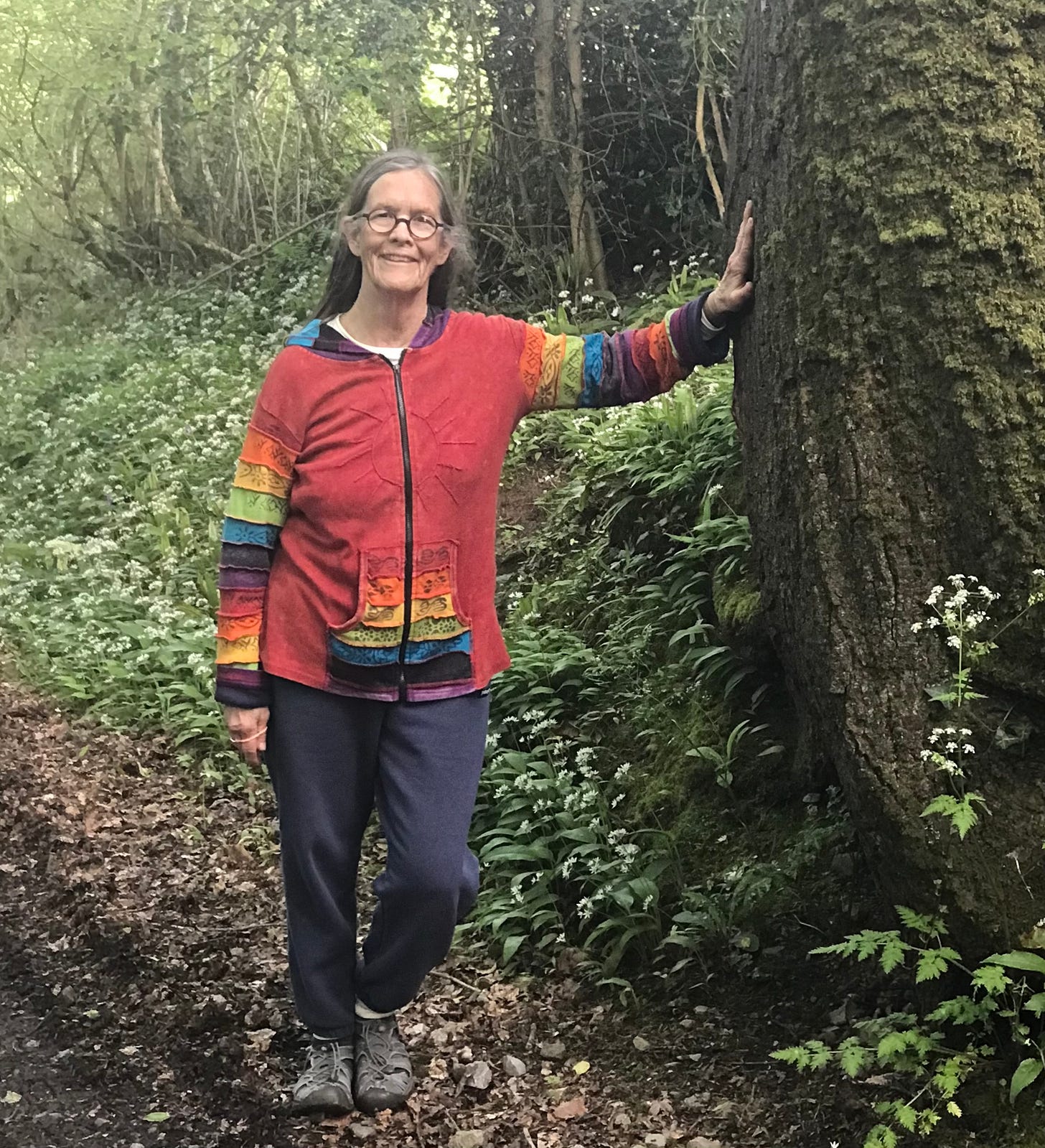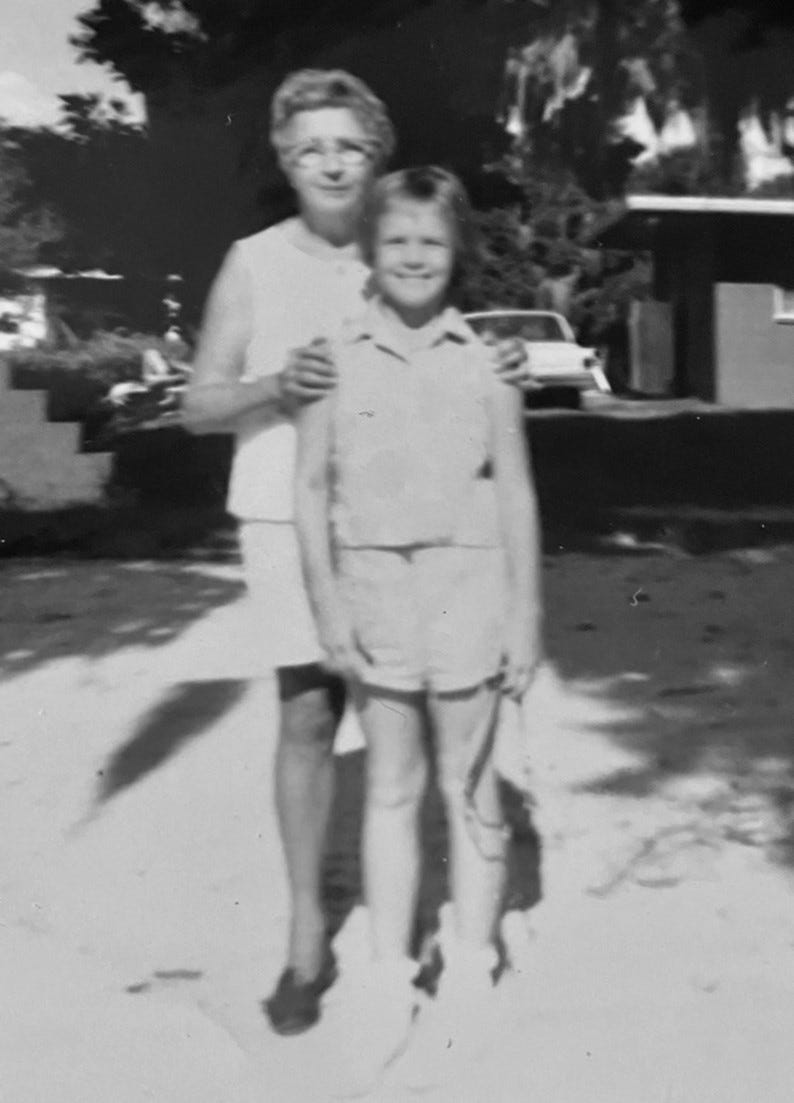Lessons in Living Life on Your Own Terms - Guest Post
This is one in a series of weekly posts from Accidental Mentors subscribers about one of their accidental mentors. Today's guest writer is Roxanne Rhodes.
Roxanne Rhodes was born in Jacksonville, Florida in 1953, on a large Navy base, the youngest of four children. Both of her parents were World War 2 veterans—her father staying in after the war to make a career of military service. They did everything on the base, an island in the midst of Jim Crow South. After graduating from Florida State University, Roxanne moved to Denver, Colorado by herself. A few years later she became a high school teacher and met a woman who was her partner for more than 35 years, raising a daughter together. Now Roxanne is happily retired with two young grandchildren.
Mercie Elizabeth Huss (Carnahan) 1901 - 1983
I met my maternal grandmother when I was six years old. She and my step grandfather retired to Florida, where my family lived. My grandmother, who we affectionately called, Bangoon, was a petite, solid woman who had short grey hair when I met her. She had an impish grin and a twinkle in her eyes that I immediately loved.
My grandparents bought a little house on a canal in central Florida, two houses down from the large and beautiful Lake Pierce. Soon Mom and I, and sometimes my brother Steve, began visiting there regularly. I loved going to this beautiful place. I slept in the back room which had jalousie windows facing the canal. In the cooler months, the windows would be open toward the canal, and I could feel the breeze and listen to Bangoon, and her husband, Grandpa Vern, talk into the night, sipping their gin and tonics. I remember thinking, how do they have so much to talk about?
My parents didn’t talk much. My father did most of the talking, pontificating, or ordering my mother and us kids around, paying little attention to my mother. Therefore, the affection between Bangoon and Vern surprised and warmed me.
I soon felt a deep affinity with my grandmother. She was very different from my paternal grandmother, whom we often visited in North Carolina, where my father grew up. This grandmother deferred in every way to my grandfather and the other men around her. I barely remember her voice. She smiled sweetly, served quietly, and seemed to have no opinions of her own.
Bangoon was a whole different kind of woman. My father barely contained his dislike for her. She never said anything critical to him, but I knew she had his number. He only came to the lake once in the years they lived there, which was fine with me because their home was a respite from his dominance and safe haven for Mom. I loved Bangoon for creating a sanctuary for my mother.
Bangoon was born Mercie Elizabeth Huss in Pierre, South Dakota in 1901. Her parents were quite progressive. They had a ranch in central South Dakota and a home in Pierre. Her mother, Minnie Mae Calfee, came to South Dakota as a Methodist Deaconess. Her father, Frank Huss, had come west in 1881 and established a ranch in central South Dakota. Minnie met Frank, a widower with two children, soon after she arrived in Pierre and they married within a few months. My grandmother was their first child together, they would have two more.
Bangoon was very proud of her parents and the work they did among Native Americans and within the community of Pierre. She once said to me that her family was “one of seven families in the area that didn’t hate Indians,” emphasizing the word hate. My great-grandfather did work with and for the Natives. The Lakota Sioux made him a blood brother. His Lakota name was Hoksila Hanska, or Long Boy.
The stories Bangoon told me about her parents standing up for the local tribes and against the pervasive racism of most of their neighbors, had a significant impact on me as a child, growing my sense of racial justice. She supported the Civil Rights Movement. I looked up to and admired her.
In addition to their defense of Native Americans, her parents supported women’s suffrage and education for women. Her mother was an early advocate in the new field of social work. They were avid readers and had lively discussions about history, politics, and other topics of the day.
Bangoon was sent to Dakota Wesleyan College to earn a baccalaureate degree after high school. Her college education was cut short at the end of her freshman year. A late spring blizzard hit central South Dakota hard and destroyed most of her parents’ cattle. There was no money left for Bangoon to continue her education.
After she came home, Bangoon met my grandfather, Howard Manning, who was fifteen years older than her. They married and my mother was their first child, born in Wall, South Dakota in 1923. Soon after, Howard moved them back to a small town in Missouri where his family lived. They had two more daughters, my aunts Jeannie, and Mae.
The Manning family was the opposite of Bangoon’s. They were conservative and patriarchal. Bangoon told me that she “got in trouble” with Howard when she voiced her opinions as the men discussed politics. My grandmother was strong-willed and too much an independent thinker for her husband. He tried his best to dominate her. Things went from bad to worse. My grandfather’s drinking and determination to keep my grandmother in line became fiercer. He started yelling at her and pushing her around. She began to plot her escape.
Bangoon had friends in Missouri, a couple who sympathized with her. One day, after her girls had gone to school, she began packing their suitcases. She picked up Aunt Jeannie early from school and they walked to the edge of town and down into a dry wash under a train viaduct to meet her friends. They gave her an envelope with train tickets. She and Aunt Jeannie walked back home and finished packing. That evening, Bangoon and her girls walked down to the train depot and got on the train to Rapid City, South Dakota, where her parents now lived. This was in 1931, during the Great Depression. Bangoon told me, “I only had five dollars in my pocket but was determined to leave.”
Soon after settling with her girls at her parents’ home, Bangoon found work at Canyon Lake Lodge, learning how to cook and manage. About a year later she bought a small diner in Rapid City called the Dixie Lunch. She filed for divorce and because Howard didn’t respond to the divorce papers or show up for court, it was granted. She never received any monetary support from him for their children.
The Dixie Lunch burned down about eight years later. Bangoon moved to Wyoming and bought another little café in Upton, Betty’s Café. A few years later, she married my Grandpa Vern. They moved to Winslow, Arizona and then to San Francisco, California with his job. Bangoon loved the beauty and liberal atmosphere of San Francisco.
Eight years after they moved to Florida, Vern died. Bangoon sold the house and moved to Englewood, Florida where she lived directly next to Lemon Bay, on the Gulf of Mexico. Bangoon chose Englewood because she had a few friends from South Dakota who lived there, and she had always wanted to live close to the ocean. She quickly got involved in the community and worked hard raising money to help build the first fire department in Englewood.
When I was a student at FSU, I would sometimes drive down on weekends to be with Bangoon. She loved being out in the sun and had deeply tanned skin. We would drive out to the beach to swim in the Gulf of Mexico, have a hamburger and talk about everything under the sun. Bangoon had an older friend there who had worked for her father when she was a child, a widower named Nels. Sometimes the three of us would go to Whiskey Corners, a bar with a live band. Bangoon and Nels would dance every dance with friends or each other. They both loved to dance. Bangoon told me, “People who dance are happy people.”
Bangoon always displayed a portrait of President Franklin Roosevelt. She revered him as a champion of the common people. Once, I told her I had gotten involved with the Christian left and that these people were setting up “conscious communities” based on sharing their resources as well as working for social justice and economic equality. I’ll never forget what she said to me, “you cannot read the gospels carefully without realizing they are a socialist tome.”
In 1981, Bangoon had a stroke and ended up back in Wall, then Rapid City at a nursing home. Once she lost her independence and her ability to write poetry, play the piano, and dance, she declined rapidly and died in August of 1983.
Bangoon was a very influential person in my life and modeled for me how to create my own path even in the face of criticism. I adored her. She lived life on her own terms, divorcing at a time when it was very rare and controversial, bearing society’s judgment with her head held high. I already had the seeds of independence when I met her. Bangoon watered and fed those seeds and helped me grow into a strong woman.









Me too! A great role model to take of myself and not allow someone to control me. I’m glad you liked my story. Thankful to Annette for starting this project and encouraging me.
She sounds a remarkable woman, I am so glad that she escaped her abusive husband and managed to have a good life.